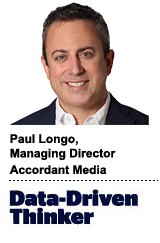 “Data-Driven Thinking” is written by members of the media community and contains fresh ideas on the digital revolution in media.
“Data-Driven Thinking” is written by members of the media community and contains fresh ideas on the digital revolution in media.
Today’s column is written by Paul Longo, managing director at Accordant Media.
A media agency’s core DNA has traditionally fed a model built around the media planner. In recent years, agencies have received much criticism for conferring too much responsibility of their strategic media efforts on young planners in their 20s.
Certainly, many shops are still mired in that old mindset. And while it seems that agencies acknowledge that the planner’s role must be transformed to realize the potential of always-on marketing, there needs to be a quick shift to action to meet current planning realities and changing client needs.
To fully appreciate, it could be instructive to take a historical view of the evolution of agencies in the past 15 years. Until the aughts, most media planners focused on traditional planning – including target audience preparation, strategies and tactics – just once a year or quarterly. Once that planning was complete and campaigns were set in motion, things would ramp down. Optimization was a maintenance endeavor that took up no more than 30% of agency media folks’ time.
In recent years, that 70% planning and 30% optimization paradigm has flipped, due to the advances of technology and the development of programmatic media. Teams now must optimize on the fly in real time because clients increasingly demand it. It started with search. Because of access to data, agency search marketers focused on optimization in real time vs. quarterly.
Recognizing this shifting dynamic, agencies now refer to search planners as search analysts or strategists instead. It has expanded into other programmatic channels, running the gamut from display and mobile to online video and social newsrooms, as well as out-of-home and addressable TV.
New Skills Needed
As we bury the notion of the static media plan in favor of the always-on media plan, new skill sets are required. Agencies now need more people with competence in tools and dashboards, with quantitative and analytic backgrounds. They must have the ability to manage large data sets to make material impact on client KPIs. Agency staffers now must be more adept at esoteric technology, such as troubleshooting tagging and pixels. I would challenge them to accelerate the pace at which these new skill sets are being integrated for the good of the entire ecosystem.
What they’ve accomplished in search now needs to be replicated in other segments like digital media, mobile, out-of-home and television. The message should be to integrate search and trading desk skill sets into other parts of organizations. For example, roles like an out-of-home data analyst and TV buyers with optimizing skills should be mandatory at agencies.
Nowadays, meetings with publishers and tech partners are no longer media-only conversations. They are now media-plus-technology conversations. When a sophisticated dashboard is presented, are agency teams leaning in and asking questions or are they leaning back and saying, “Oh no, not another tool to learn.”?
Is a director of emerging talent a necessary agency role? It could be helpful depending on how organically the shop has embraced technology. Fear of innovation and resistance to change is still too prevalent.
Advertising has always been and will continue to be art and science. Within agencies, it is true the science needs to accelerate at a faster pace. As automation improves productivity in rote and operational work, the emphasis will shift to higher-value activities. Alongside this redefining of roles, a new, more progressive mindset would be helpful. Agencies could learn a lot from the startup world where it’s OK to fail for the sake of progress. If they don’t, this new generation of talent will not come on board.
There has been a brewing debate in the agency world regarding the best route to transform into technology-enabled marketing and media companies. Will it be through partnerships or through building proprietary technology, as WPP Group’s Xaxis in-house trading desk recently announced it was doing by investing in the construction of its own data-management platform?
Regardless of the route, one thing is clear: The most successful path toward cutting-edge relevancy will be through an embracing of new models and modern, transformational talent.
Follow Accordant Media (@Accordant) and AdExchanger (@adexchanger) on Twitter.













